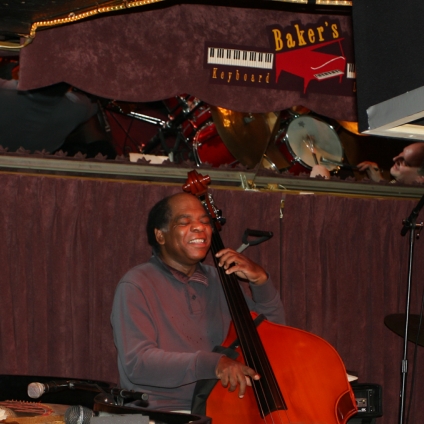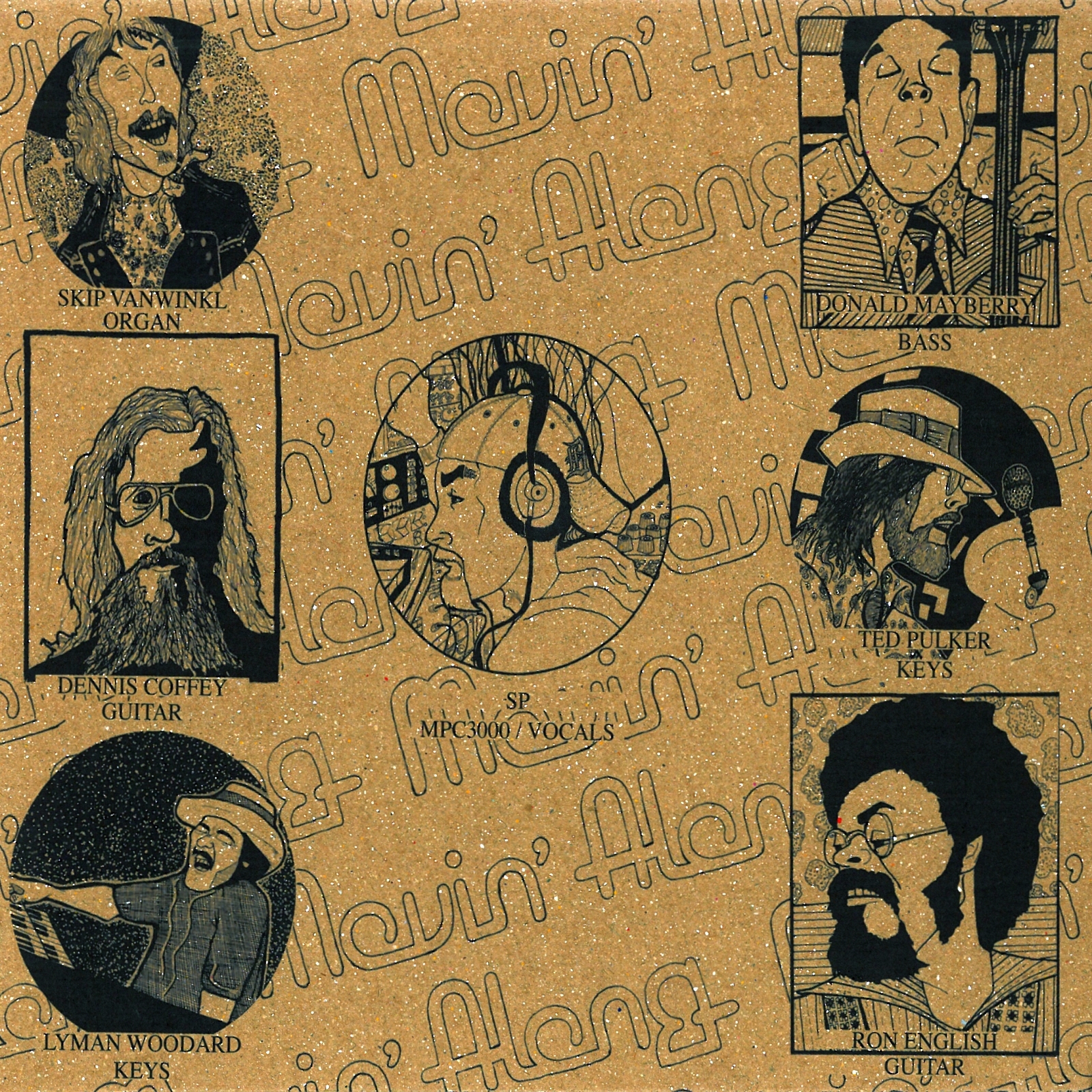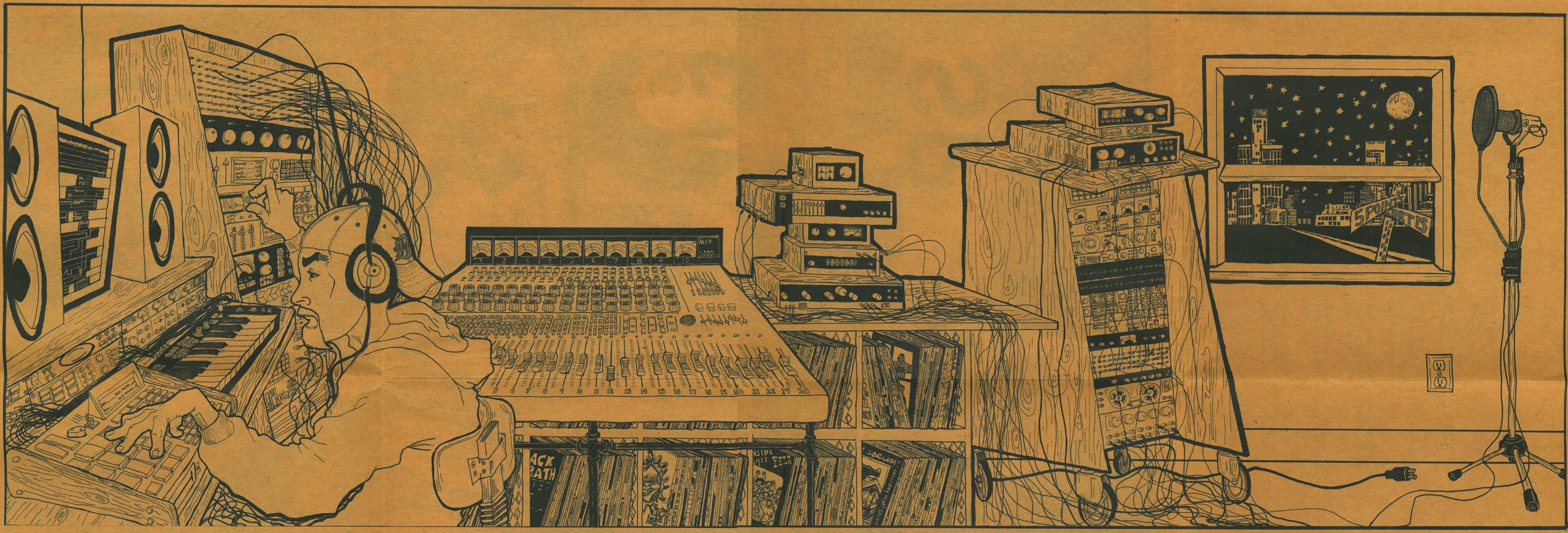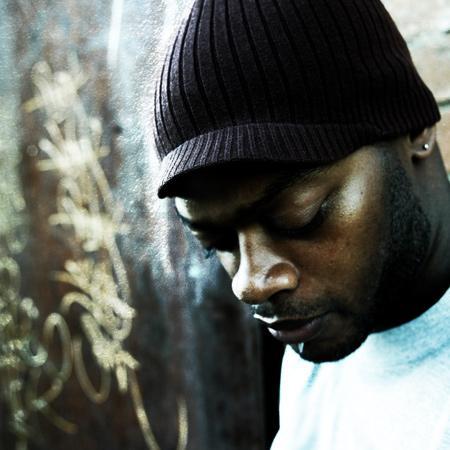Download SP – Movin’ Along (right click and select “Save Link As…” or “Save Target As…”)
01. Intro / Fallin’ Down
02. Night At The Funk Party (Feat. Massey Luv, Newman, IQ, Chikaramanga, Gambit The MC, Brainstorm, & Maanumental)
• With Dennis Coffey on guitar, and Lyman Woodard on organ
03. Wreckless
• With Ron English on guitar, Donald Mayberry on bass, and Tekay One on the cuts
04. Look At Us Mean (Feat. Brainstorm & IQ)
• With Dennis Coffey on guitar, and Eduardo Scizzahandz on the cuts
05. Mytown (Part 1 Of 2)
• With Ron English on guitar, Lyman Woodard on Wurlitzer and Fender Rhodes electric pianos, and SP on the M-Tron
06. Motown (Part 2 Of 2) (Feat. Sulai)
• With Ron English on guitar, Lyman Woodard on organ, and SP on the M-Tron
07. Street Rappin’ (Feat. Shawn Jackson & Newman)
• With Tekay One on the cuts
08. That Cat Is High (Feat. Brainstorm & IQ)
• With Ted Pulker on Fender Rhodes electric piano, and Tekay One on the cuts
09. Woman Child (Feat. Gambit The MC)
• With Dennis Coffey on guitar, and Skip Van Winkle on organ
10. Next
• With Dennis Coffey on guitar, and Skip Van Winkle on organ
11. Movin’ Along (Feat. Sulai)
• With Ron English on guitar, and Ted Pulker on grand piano and Fender Rhodes electric piano
12. Motown (Unity Remix)
• With Ted Pulker on Fender Rhodes electric piano, and Tekay One on the cuts
In 2008, P-Vine Records released SP‘s solo album “Movin’ Along” in Japan. P-Vine was the label that was so supportive of the Starving Artists Crew early on. Back in 2001, they released their first 12″ Single, “Artistry Original b/w Four Square“, and in 2003, they released their first and only full-length album, “Up Pops The SAC“. For more on the Starving Artists Crew, check out my “Old School Hip Hop“, “Cultural Vibe 2003“, “SAC Lunch: Up Pops The Mega-Mix“, and “Starving Artists Crew – Efil4cas” posts!
The following has been paraphrased and taken from the linear notes included in the CD version of “Movin’ Along”…
In 2005-2006, during the early stages of recording a second Starving Artists Crew album, SP moved out to Los Angeles and Brainstorm moved out to Arizona, while IQ remained in Detroit. The long distances had a negative effect on the group’s dynamic, making it difficult to continue recording songs and stay committed to a second album. Eventually, they decided to call it quits as recording group, but still remained close friends.
When SP first moved out to Los Angeles and was trying to get settled in, he couldn’t help but feel homesick. During his first couple of months in LA, he was drawn to the old Detroit-based records that he had brought with him and found himself listening to them more and more. Some of these records were ones that SP had found throughout his years of digging, while others were hand-me-downs that were given to him by friends after they had come up on better/cleaner copies. SP found comfort in these old records. They reminded him of “home”.
At the same time, as a beat maker, SP was getting a little restless. He had not been making any beats since the move, and he didn’t have anyone (yet) to record with in LA. SP needed to get back into his groove, so after setting up his equipment, he began to sample and play around with the old Detroit records that he had been listening to.
This led SP to an idea for a concept album that had not been done before… to make a Rap album using samples from Detroit-related records only. These records had to be pressed, recorded, or released by Detroit-based companies and musicians. SP didn’t have enough Detroit records for a proper full-length release, so he flew back to Michigan to hit up the usual record spots and hook up with a few of the private sellers:
After returning to LA, SP continued making beats and working on his project. About a month later, while helping build a new home recording studio for Thes One (of People Under The Stairs), they struck up a conversation about implementing live musicians into their music. SP thought to himself, “Yeah, why not contact a couple of these original musicians and have them do some overdub recording over my beats?” By adding live musicians to his beats, it would thicken up the music a bit. It would also help bridge the gap between the sampling Rap producers of today (e.g., SP) and the original sampled artists (i.e., the musicians that played on the old albums).
The first person that SP got a hold of was Skip Van Winkle (above). Skip was the organ player for the band Teegarden & Van Winkle, who is best well known for their song “God, Love, And Rock And Roll“. Skip was also Bob Seger’s organist during the Smokin’ OP’s era. With just a quick online search, SP found David Teegarden’s Natura Digital Recording Studio website and emailed him for Skip’s contact info. To SP’s surprise, Skip was living just about 30 miles northwest of LA, and he soon found himself at Skip’s house to do a trial-run recording.
The first song that they recorded was “Woman Child”, and the session went so well that SP began to rethink everything and reconsider the concept for his album. With the idea of incorporating live musicians being tested and the results surpassing all expectations, SP’s concept for the album began to transform. His goal now was to contact at least one musician from every album that he made a beat from and to get him/her to play on his version. However, this proved to be quite a challenge.
As SP continued tracking people down and asking about the others on his list, there were quite a few musicians who had already passed away. This made it impossible to get at least one original band member from each songs to appear on the album. Although he wasn’t able to do exactly what he planned on, SP came very close to his goal and was able to round up a core group of all-star musicians who were willing to participate. In the words of SP, “it was cool playing detective and tracking these folks down because I got the opportunity to hear plenty of great stories and shoot the shit about all kinds of interesting stuff”.
The next person that SP was able to contact was Lyman Woodard (below left):
After explaining the concept of what he was trying to do, Lyman seemed interested in the idea but wanted to first hear the two beats that SP had made (using his 1975 album “Saturday Night Special”) before agreeing to anything. While talking with Lyman, SP asked if he had Ron English’s phone number, to which he replied, “Sure Shawn, it’s…”
So with Lyman Woodard now on board, SP contacted Ron English next:
Ron’s work is probably best known for the guitar solo that he provided on The Woolies‘ 1966 Garage classic “Who Do You Love?“. After securing Ron, SP then got in touch with Don Mayberry:
The photo of Don (above) was taken at Baker’s Keyboard Lounge. Here’s a trailer for the documentary “The Other Eight Mile: The History Of Baker’s Keyboard Lounge”. Don Mayberry had a history with this Jazz club. As a kid, he would go there with his dad (who had to pull a few strings to get him in) and hang out with the bassists in the dressing room. You can hear Don talking about the club at the 2:05 mark:
http://www.youtube.com/watch?v=ajHqdzYX-xM
Unfortunately, SP’s efforts were temporarily put on hold when he learned that his grandfather had become very sick and was fading fast. Since he was very close with his grandfather, he immediately flew back to Michigan to see him and say his last goodbyes. A week after SP returned to LA, his grandfather passed away, and SP flew back out to Michigan for the funeral.
Upon returning to LA, it took SP a few weeks to adjust to the loss of his grandfather and to digest everything that had recently been happening in his life. But he gradually began to feel like working again and started contacting the rest of the musicians that were to appear on the album. The next person that SP was able to get a hold of was a keyboard player name Ted Pulker. Ted was the leader of his own band in the early 1970s, playing in various clubs around Detroit. In 1975, he joined a Detroit R&B horn band called Riot, and a little bit later joined the group No Dice.
With Ted on board, SP looked up the person who was probably the most well-known person on his list: Dennis Coffey (above). As they talked on the phone for the first time, Dennis said, “Why more people haven’t contacted me to do things like this I’ll never understand. I mean, people sample my records all the time. Why not have me play on the songs instead?” This was exactly what SP had been thinking all along! Once Dennis gave him the green light, SP finally had his “first string” core of six musicians who would play on his album.
In the words of SP, “I have to say that during this process, certain things became very clear to me in my dealings with these guys on the phone. Whether it was hearing them talk about music, or calling them while they were in the middle of practicing, it all made me realize that I’ll be doing this music shit until die. That was a realization that I had not come to yet in my life… I’m still kind of young, but these guys aren’t, and soon I won’t be either. It just had me thinking a lot about my mortality and how I only have a short time on this earth to do what I want to do, let alone musically… Couple this with the fact that my grandfather had just died, [and] I was zonin’ about some whole other shit altogether!”
With SP working a full time job, it was difficult to nail down a date that worked for everyone, as well as find a studio in metro Detroit that was available and affordable. He booked a weekend in March of 2007 at a studio in metro Detroit called the Plymouth Rock Recording Co.
About a week before SP was supposed to fly into Detroit, he got a call from Lyman. He wanted to know what key “Joy Road” was in now that SP had sped it up. (“Joy Road” was the original song of Lyman’s that SP had sampled for “Mytown”). SP didn’t know what key it was in, and he didn’t really know what key any of his other beats were in either, so he had to go back and re-listen to everything.
SP ended up having to slow down or speed up almost every song on the album to make sure that it was in key. “What key? Any key, just not falling into the half tone category!” According to SP, “You can’t really tune a piano up or down if the song is off by a half tone… [but] a guitar or bass guitar would be different and we could fudge those if necessary”. It was down to the wire, and SP had to work nonstop to get all of his beats prepared for the musicians before his flight to Detroit.
The first day of recording was an all-day ordeal. He started with recording Don Mayberry on bass, and then Lyman Woodard on keys. He then recorded Ron English on guitar, and then Ted Pulker on keys. As SP recalls, “It was a great experience that not only was a blast, but actually taught me a lot about working with live musicians in a studio setting. Also, because I used Detroit musicians that came up in the 1960’s and 1970’s, a lot of them knew each other and got a chance to catch up after not seeing each other for years. I got to listen to them talk about past experiences, life, death, and of course music and other musicians. I got the sense that there was a sort of common respect among them for one another and their accomplishments. Plus, the guys were all great to work with and did their best to understand what this novice producer was trying to do.”
SP continues, “I remember a point during one of Lyman’s solo takes that I was just completely blown [away] by the emotional intensity of what and how he was playing. It sounded beautiful yet painful. I was finally starting to realize the potential in what I was attempting to do here. This was an amazing experience unfolding in front of my eyes. I couldn’t believe that I was the producer directing these amazing musicians. I felt extremely honored, blessed, and lucky to be a part of it all. It really shaped up to be a great first day. All I had left was one session with Dennis Coffey the next morning and I was off to LA again.”
Once SP got back to LA and began to mix down all of the newly recorded tracks, there were a couple of songs that he wasn’t really happy with (compared to others). This was mostly due to the fact that he didn’t have any of the guys playing on them at all. So after a couple of days of mulling things over, he called up Dennis, Lyman, and Ron, reserved another day at the Plymouth Rock Recording studio, booked a plane ticket back to Detroit, and recorded one last session with them.
Between the time that SP began recording the musicians and the time that most of the songs for album were completely mixed down, SP had made a couple more beats and wanted to add one more song to the album. There were also some things that he wanted to try and re-record with Ted Pulker (who had been living in Nashville for many years). Plus, back in Michigan, there were all of the cuts and scratches from Tekay One & Eduardo Scizzahandz that needed to be coordinated and recorded.
In order to finish the album, SP made the hard decision to take a leave of absence from his job for one month, and embarked upon a Clark Griswold trek across America. As SP described it, “First stop was Arizona, to re-record some vocals with Brainstorm. Second, drive down to San Antonio to meet my girl’s dad. Third, drive east to Opp, Alabama to visit my dad… Fourth, drive up to Nashville to record with Ted Pulker. Fifth, take a trip through Rantoul, Illinois to record with Chuck Sweitzer of the Lansing-based rock band Plain Brown Wrapper (whose session unfortunately did not make the project). Sixth, get my ass to Detroit to do all the rest of the shit that I need to do in order to complete the album”.
When SP finally got back to LA and took inventory of what he had, and what he still needed to complete, he realized that there were a couple of songs that he wanted someone other than himself to rap on. So SP called up an old friend, Sulaiman (above), and asked him to do some vocals on the album. SP and Sulai had grown up together and was one of his first rhyming partners, so he wanted to include him on the album for “old time’s sake”. Sulai was living in Phoenix at that time… so a month later, SP flew out to Phoenix, recorded the vocals with Sulai, and then came back to LA.
SP took the next couple of months to finish up the album. He still had some of his own vocals to record on a couple of songs. Plus, he had some final tweaking and volume/EQ level adjusting to do on all of the songs before having it mastered.
“I called this project Movin’ Along because of the circumstances surrounding its conception. I’ve been moving along in many different ways over the last three years and I wanted to represent that in this album. I was moving along in terms of relocating to LA, I was moving along and away from the Starving Artists Crew, and I was also moving along in terms of what I was doing musically. I wanted to paint you all a picture of my life back home [Detroit], the events leading up to me moving, and what my hometown really means to me. I also wanted to include some of the new friends that I have made in LA to display the joining of the two. Although I haven’t lived in Detroit my whole life, it’s definitely been the biggest driving force in terms of my musical inspiration and the place where my heart will always rest…”
Since the release of “Movin’ Along” in 2008, some of the musicians that appeared on the album have passed away. Lyman Woodard passed away in February of 2009, Donald Mayberry a couple of years later in April of 2011, and Ted Pulker the following year in February of 2012. SP was very lucky to have had the chance to get to know them and share some wonderful experiences with them in the few remaining years that they had left… “I felt extremely honored, blessed, and lucky to be a part of it all.”



















Classic. Still waiting to get a vinyl copy from SP….lol
Dope stuff !! How can I get a copy of SP’s early work / Beat poetry and IQ’s Pay Attention ??
honestly this whole timeline, from your start as a dj leading through SAC and ending with SP’s album should be made into a documentary/movie…it’s such an interesting story, and it’s honestly sad that no one really knows about it. update us on how everything is going in 2016!
Kevin, thanks for doing this my brotha. Much respect to you and your influence on us as a group. Up Pops would have ever been nearly as good without you involved.
It is sad. Sad as fuck….
I was an overly-confident dick most of the time and huge pain in the ass (and for that, I’m sorry). I tried to make things “better”, for better or for worse. I’m so proud to have been a part of everyone’s lives at that time. Looking back, it was the pinnacle time of my life! Thanks for being our el capitano, master beat smith, and chief mic rocker!!